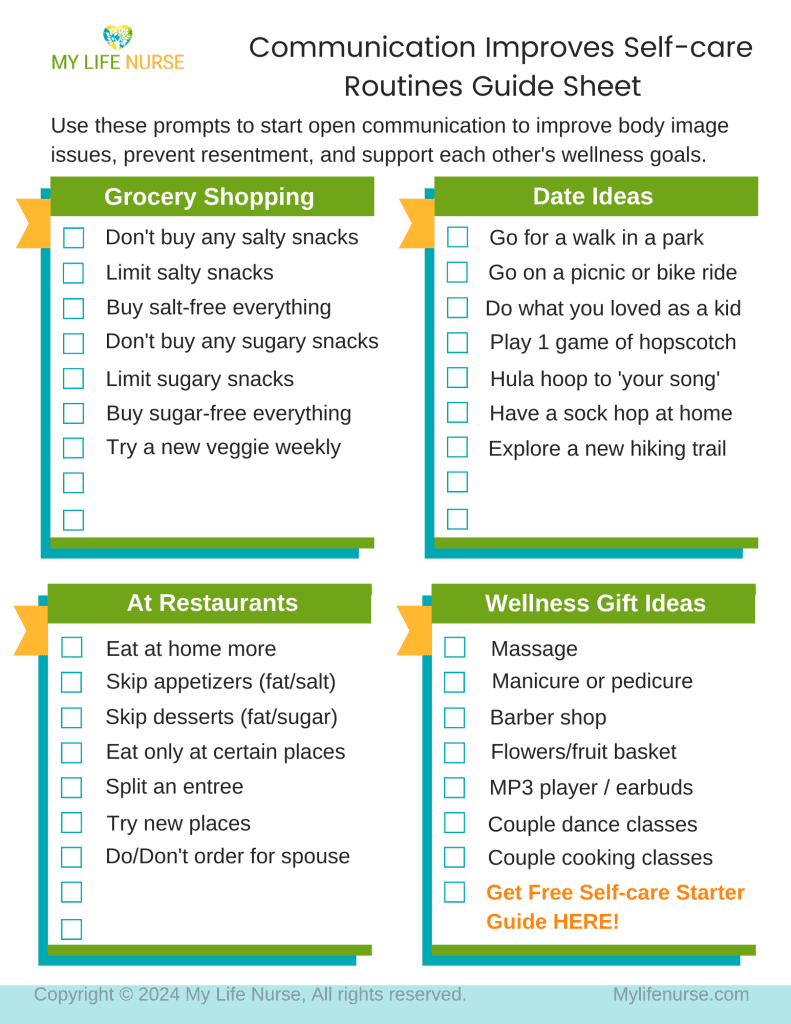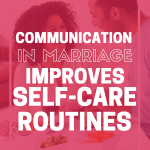Did you know better communication in your marriage improves self-care routines? Share these 3 critical things with your spouse to have more effective self-care.

I once had a patient tell me she was working hard to lose weight for a special event, a class reunion, but her husband made it harder for her to meet her goal.
When they went out to eat, he kept ordering a dessert for each of them to share on top of her order. She didn’t want to complain because they were on a date, but it was causing her some irritation, resentment, and even bitter feelings towards her husband.
The wife even started thinking he was purposely making it harder for her to meet her weight loss goal. She could not understand why he was doing this.
Guess what.
He had no idea his actions were upsetting to her.
Her husband was trying to make her happy. He remembered that she loved to share a dessert when they first met, and he thought, wouldn’t it be more fun for her to share two?
Of course, he had no idea how much stress his actions were causing her!
But now, he’s stopped ordering desserts because he knows what she wants. This is what I mean by your communication can improve self-care, so let’s get into this topic.
Are you exhausted and overwhelmed? This Self-care Starter Guide will show you 3 simple steps to take RIGHT NOW to better care for yourself.
Be sure to grab yours! Get your FREE copy of the Self-care Starter Guide HERE!

Crazy communication barriers like the one I described above happen daily in relationships!
Learning each other’s needs can
- Help encourage and support each other’s health and wellness goals.
- Improve success in self-care and routines.
- Identify where you need to be more sensitive to each other’s triggers or weaknesses.
Sharing the 3 critical subjects described below with your spouse can improve communication in your marriage and self-care routines.
My referral and affiliate links are below. If you click through & make a purchase, I may receive a commission at no additional cost to you. My full disclosure can be viewed for details.
Self-care Goals
This one is pretty straightforward.
If your spouse doesn’t know what you are working towards, he/she won’t know how to help you get there.
Share:
- Your overarching goal.
- When you want to meet it.
- How you plan to reach your target. If it makes sense, you can even be specific about what you need from your spouse to meet your goal.
Afterward, your spouse will know how to help and encourage you to reach your health and wellness goals, and you’re better equipped to help your spouse.
But be prepared.
Looking for a way to stay motivated to take better care of yourself? Click my affiliate link to check out my Bible study.

Support Your Spouse
Your spouse may have different ideas and attitudes about health and wellness goals.
Still, you can help your spouse despite your very different goals. It’s okay if you both work towards a similar goal in two different ways.
The point is to support and encourage your spouse in the best way for them.

Address Emotional Triggers
This one is a little more complicated but extremely helpful.
Focusing on your self-care can help you find your triggers. You know, those little signals that provoke you to eat bad foods or interfere with what you want to do or don’t want to do (often without your knowing).
Sometimes, these cues are the same gestures that lead to negative emotions.
Have you ever been in a conversation going well, and suddenly, you or your spouse were offended by how something was said?
The intent of what was being said often had no connection to how it was heard. However, a word, phrase, or tone somehow got attached to an emotional signal that generates a desire to respond, often out of context for the situation.
That’s upsetting and stressful!

So, being aware of your and your spouse’s triggers is helpful.
When you know how your spouse hears and reacts to certain phrases or words, you have the answer to improving things (or worse) for your spouse.
Using this information in an encouraging and supportive way can help you avoid saying or doing unhelpful things and identify the helpful things to say or do.
It may be embarrassing for some people but share these findings openly with your spouse. Be specific. You don’t have to share every little thought or reflection in your mind, but give them examples of words or phrases that bother you and how they make you feel.
And a step deeper, if you know it, share the reason why.
All of these things will help with communication in your relationship!

Free Download Improves Self-care Routines
But, it can be hard for some people to talk about triggers. I’ve found more people are comfortable talking about the difficult subject of what they like or want out of intimacy versus sharing their sensitive topics or triggers about their bodies and emotions.
So, I’ve made a communication prompt to help you identify and share sensitive triggers.
These ideas might seem overly simple or even kind of silly, but I encourage you to have an open mind. This guide includes real comments I’ve heard clients and people say!
This FREE handout has various question prompts to help start a conversation.
I have some suggestions to get you started and a prompt for that conversation, too!
This guide is helpful if:
- You want to establish guidelines for dining at restaurants.
- You’re looking for date ideas to help you exercise, relax, or reconnect with nature.
- You are working on self-care and have a weakness for sugary or salty snacks.
Topics include:
- What to bring home from the grocery store.
- Date ideas for exercise or relaxation.
- What to order or not order at restaurants.
- A list of wellness gifts you can discuss.
A huge tip: ask each other if you are open to wellness gifts for birthdays and holidays. Then, they can express to each other what their idea of a wellness gift looks like. For some, it’s a manicure; for others, it might be an MP3 player.
In closing, it takes some work, but improving communication in marriage improves self-care routines for you both. Learning each other’s goals and triggers can show you how to encourage and support your spouse, which can improve your success in the self-care routine!
Don’t forget your FREE Self-care Starter Guide! Get it HERE.

Related Posts
5 Ways Self-care Can Improve Intimacy In Your Marriage
4 Simple Communication Tips to Be Happy in Marriage
Thanks for reading! Know someone who would benefit from reading this post? Share it on social media!


Ready for more? Here are my latest posts!
- Best Printable Advent Bible Reading Plan for Rest
- 4 Quick & Easy Tips to Lower Blood Pressure
- When the Holidays Feel Heavy: 9 Simple Self-Care Tips for Missing Someone You Love
- 10 Frugal Foods to Eat for a Healthy Pregnancy and Baby
- 9 Must-Read Blog Posts to Manage High Blood Pressure Naturally
Article originally published 2/1/2019

Be sure to grab your FREE Self-care Starter Guide! Lisa Kimrey is a 33-year veteran registered nurse (RN), speaker, and author of the Bible study, The Self-care Impact: Motivation and Inspiration for Wellness. At Mylifenurse, Lisa combines her nursing expertise with Scripture-based encouragement to show readers who serve and care for others how to begin and maintain their self-care journey – without feeling guilty or overwhelmed – to feel happy, healthy, and rejuvenated.

